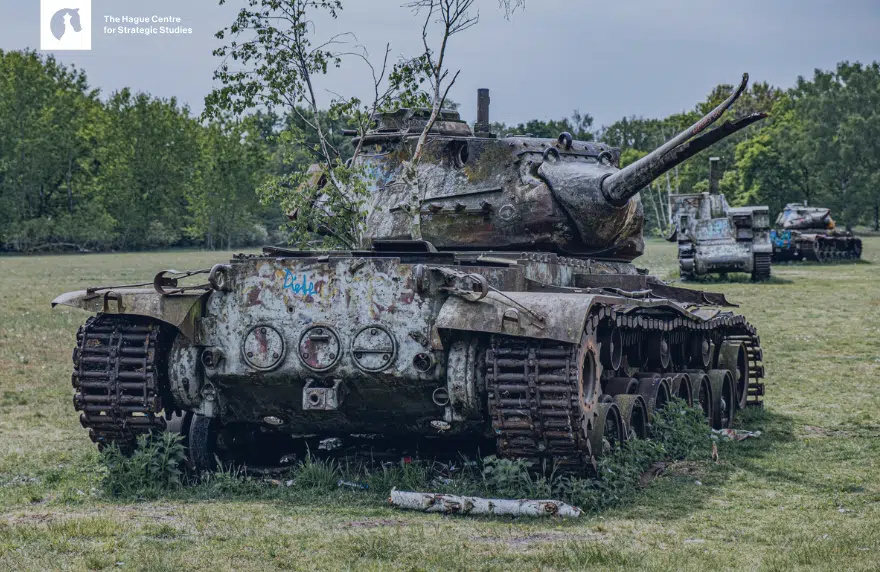New joint HCSS/Clingendael publication | More than ten years after the Russian annexation of Crimea and two years after the large-scale invasion, Ukraine is still holding its own against Russia. This is not only due to the courage and efforts of the Ukrainians themselves, but also thanks to the extensive military, economic, and financial support packages from Europe and the US. For 2024, the government had allocated three billion euros for military support to Ukraine in the fight against Russian aggression and also pledged an additional three billion for 2025. Following the UK, France, and Germany, the Netherlands has entered into a ten-year security cooperation agreement with Ukraine to ensure long-term support. The recently released AIV briefing note and a recent parliamentary letter also advocate for sustained support.
However, this Western support is no longer a certainty or uncontested. Particularly in the US, but also in some European NATO countries, calls to halt support to Ukraine are slowly gaining more traction. The American support package of sixty billion dollars was stuck in the House of Representatives for months, causing significant difficulties for the Ukrainian armed forces. President Biden has scaled back his rhetoric from “as long as it takes” to “as long as we can”. New commitments for new aid to Ukraine stalled at the end of 2023 (with a nearly ninety percent drop), while promised ammunition quantities fell far short. A warning from French President Macron that a Western military intervention should not be ruled out received little support from his foreign counterparts. Although the issue of Western ‘boots on the ground’ also requires further attention, it is not addressed within this memo, and ‘support’ encompasses both economic and material assistance, but without the deployment of Western troops in Ukraine.
Following Putin’s ‘election victory’ in March, the Kremlin escalated its war rhetoric. Government officials are now openly discussing ‘war,’ whereas previously, using that word could land one in prison. This fits into the rhetoric where NATO, rather than Ukraine, is portrayed as the aggressor. Additionally, the Russian Ministry of Defence announced the formation of two new combined arms Army Corps and accelerated the recruitment of new military personnel. Meanwhile, the Russian war industry is gearing up, producing large quantities of ammunition and equipment for the Russian war effort. The extensive import of artillery ammunition from North Korea and drones from Iran, among other capabilities, further complements Russian stocks. The consequences on the battlefield are already noticeable, as seen in the loss of the city of Avdiivka in February, and developments along the front since. Meanwhile, pressure on Ukrainian troops at the front is mounting. In an interview at the end of March, President Zelensky stated that Ukraine will have to cede more land if Western material support continues to be lacking. The renewed Northern front after the second Russian Kharkiv offensive is likely to further stretch Ukrainian defences and resilience in the near future.
Despite overwhelming support in the Dutch parliament for continued support for Ukraine, there are nonetheless questions about the duration and scope of future assistance. The question regarding the costs and benefits of providing political, economic, and military support by the Dutch government is extremely relevant in this context. This constitutes more than a simple calculation where profit or loss is expressed in Euros. It also involves security risks and geopolitical and moral costs and benefits that cannot always be quantified in one-dimensional figures. It is therefore essential to adopt a broader understanding of costs and benefits, reasoned from the perspective of Dutch national security interests and the impact of international support on the outcomes of the conflict. An important consideration here is the extent to which support for Ukraine contributes to a military victory, a military loss, or a protracted conflict.
This memo contributes to the debate on Dutch support to Ukraine. The memo:
- relates the impact of European and American support to three outcomes of the war in Ukraine: a Ukrainian victory in the long term, a protracted conflict, or a Russian victory;
- analyses the costs and benefits of continuing or discontinuing support for each of these three scenarios;
- identifies the preferred options of Europe and the US for continuing or discontinuing support;
- concludes with policy perspectives for the Dutch government.
This is the English language version of a policy brief published in Dutch in April 2024, with some minor updates.
Authors: Tim Sweijs, Bob Deen and Roman de Baedts.
The authors would like to thank Rob de Wijk, Dick Zandee, Ko Colijn and Frederik Mertens for their contributions. The report has been translated from the original Dutch version by Stephanie Govaerts with the help of OpenAI’s ChatGPT and DeepL Translator.
The research for and production of this report has been conducted within the PROGRESS research framework agreement. Responsibility for the contents and for the opinions expressed, rests solely with the authors and does not constitute, nor should be construed as, an endorsement by the Netherlands Ministries of Foreign Affairs and Defence.








